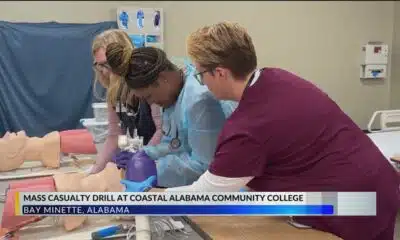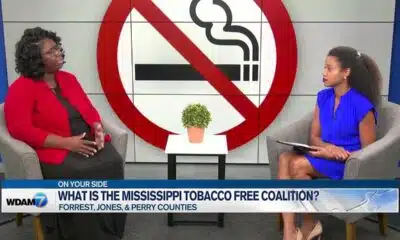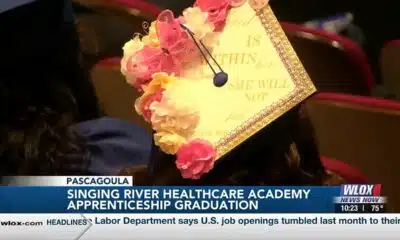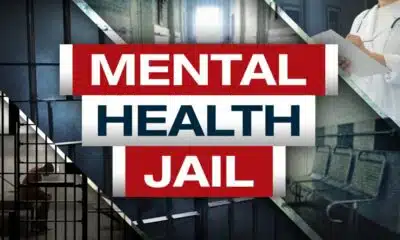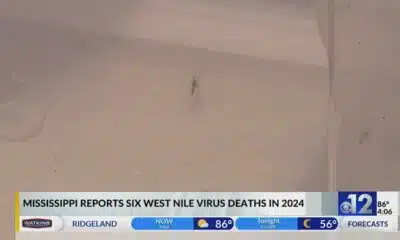Mississippi News
1 in 10 Mississippians had illegal contaminants in drinking water since 2018
1 in 10 Mississippians had illegal contaminants in drinking water since 2018
Since 2018, more than one in ten Mississippians received drinking water from their public utility that had an illegal level of contaminants in it, according to state and federal health data.
By far the most common contaminants that exceeded federal limits were disinfection byproducts, or DBPs; 29 utilities in the state, serving a combined 278,000 residents, exceeded the legal limit for those since 2018.
DBPs form when chlorine or another disinfectant used for treatment reacts with organic materials in water. But overexposure to DBPs, which are widespread across the U.S., can damage a person’s liver and nervous system, according to the CDC. They can also increase risks of cancer and affect pregnancies, says an Environmental Working Group study that published in November.
Other contaminants exceeding legal limits in the state included arsenic and radium, both of which are carcinogens. In total, Mississippi Today found 31 utilities serving 328,000 residents with contamination violations since 2018, using state health department and Environmental Protection Agency data.
Below is a map of drinking water contaminant violations found in the state:
!function(){“use strict”;window.addEventListener(“message”,(function(e){if(void 0!==e.data[“datawrapper-height”]){var t=document.querySelectorAll(“iframe”);for(var a in e.data[“datawrapper-height”])for(var r=0;r<t.length;r++){if(t[r].contentWindow===e.source)t[r].style.height=e.data["datawrapper-height"][a]+"px"}}}))}();
The EWG study — which includes a tool for users to find tap water contaminants by zip code — argues that federal limits, many of which are based on decades-old research, are not nearly strict enough; for DBPs, for example, EWG’s recommended limits are over a hundred times smaller than the EPA’s.
“We’ve taken a look at a lot of drinking water requirements, and they’re quite outdated or they’re based on outdated science,” said Tasha Stoiber, Ph.D, a scientist at EWG. “Just because your drinking water is meeting this federal legal limit, it doesn’t really mean it’s without concern.”
When asked about the contamination data, Mississippi water experts pointed to the financial hardships most utilities face, and the expensive procedures, such as reverse osmosis, required to remove DBPs. Moreover, they added that what contaminant data does exist doesn’t paint the whole picture.
Unknown scope of water contamination
Whether it’s a type of contaminant or a type of system, there are several holes in the way the state and country conducts drinking water testing, especially in rural areas.
Jason Barrett, an associate professor at Mississippi State University’s Water Resources Research Institute, analyzes testing data from private wells, where about 13% of Mississippians get their drinking water.
No testing requirements exist for those private connections, but anyone interested can pay between $10 to $20 to get their water tested at either a private lab or the state health department. Those tests, however, only look at a small fraction of the contaminants that public systems are required to check for.
Barrett said what private well data does exist is concerning, showing a coliform bacteria presence in about one-third of those connections. But that data is only a tiny glance of the reality: MSU and the Mississippi State Department of Health together test about 1,500 connections per year, which is only 1% of all the state’s private wells.
“These are people that are going out of their way, saying, ‘Hey, I don’t know what’s in my water, but I’d like to know it’s safe,’” he said. “So these are people that are curious and conscious about it, and we’re still seeing about a third of them have bacteria.
“Think about all the people that don’t really care and don’t really know to care.”
Too many utilities, not enough money
Similar to the publicized shortfall with Jackson’s water system funding, many utilities are struggling to stay up to code because of aging infrastructure and a decrease in federal funding over the last few decades.
“I think what is often lost in these conversations is that when the Clean Water Act and the Safe Drinking Water Act were enacted by Congress in the 1970s, they came with significant federal investment,” said Stephanie Showalter-Otts, director of the National Sea Grant Law Center. “It wasn’t local communities and towns and cities paying to build water treatment facilities, that money was coming from the federal government.”
Showalter-Otts works with a group at the University of Mississippi studying the presence of lead in the state’s water systems, the severity of which is unclear because of limited federal requirements and Mississippi’s lack of lead tracking.
Barrett added that financial constraints are also due to the amount of utilities in Mississippi.
“We’re in bad need of some consolidation across the state,” he said. “We’ve got way too many systems for the population. If you look at public water systems per capita, we’ve got to be leading the nation. As small as we are, less than 3 million people, and we’re sitting at over 1,100 public water supplies.”
He explained that nearby utilities can save costs by combining operations, such as building a shared well between two towns.
Rural water associations, he added, are especially handicapped because they serve such small populations, and their board has to be comprised of members from the community.
Overall, Showalter-Otts expressed the need for more testing, whether it’s for lead or for agricultural-related contaminants such as nitrogen and phosphorus. When asked about the hundreds of millions of dollars coming to Mississippi through federal legislation, she said she hopes the state will value water systems with its spending.
“I think it’s important that water be considered part of our infrastructure,” she said. “Infrastructure is more than roads and bridges, it’s also our water, wastewater and drinking water, how we move water around in our communities.”
This article first appeared on Mississippi Today and is republished here under a Creative Commons license.
Mississippi News
Suspect in Charlie Kirk assassination believed to have acted alone, says Utah governor
SUMMARY: Tyler Robinson, 22, was arrested for the targeted assassination of conservative activist Charlie Kirk in Orem, Utah. Authorities said Robinson had expressed opposition to Kirk’s views and indicated responsibility after the shooting. The attack occurred during a Turning Point USA event at Utah Valley University, where Kirk was shot once from a rooftop and later died in hospital. Engravings on bullets and chat messages helped link Robinson to the crime, which was captured on grim video. The killing sparked bipartisan condemnation amid rising political violence. President Trump announced Robinson’s arrest and plans to award Kirk the Presidential Medal of Freedom.
The post Suspect in Charlie Kirk assassination believed to have acted alone, says Utah governor appeared first on www.wjtv.com
Mississippi News
Americans mark the 24th anniversary of the 9/11 attacks with emotional ceremonies
SUMMARY: On the 24th anniversary of the 9/11 attacks, solemn ceremonies were held in New York, at the Pentagon, and in Shanksville to honor nearly 3,000 victims. Families shared personal remembrances, emphasizing ongoing grief and the importance of remembrance. Vice President JD Vance postponed his attendance to visit a recently assassinated activist’s family, adding tension to the day. President Trump spoke at the Pentagon, pledging never to forget and awarding the Presidential Medal of Freedom posthumously. The attacks’ global impact reshaped U.S. policy, leading to wars and extensive health care costs for victims. Efforts continue to finalize legal proceedings against the alleged plot mastermind.
The post Americans mark the 24th anniversary of the 9/11 attacks with emotional ceremonies appeared first on www.wcbi.com
Mississippi News
Hunt for Charlie Kirk assassin continues, high-powered rifle recovered
SUMMARY: Charlie Kirk, conservative influencer and Turning Point USA founder, was fatally shot by a sniper during a speech at Utah Valley University on September 10, 2025. The shooter, believed to be a college-aged individual who fired from a rooftop, escaped after the attack. Authorities recovered a high-powered rifle and are reviewing video footage but have not identified the suspect. The shooting highlighted growing political violence in the U.S. and sparked bipartisan condemnation. Kirk, a Trump ally, was praised by political leaders, including Trump, who called him a “martyr for truth.” The university was closed and security heightened following the incident.
The post Hunt for Charlie Kirk assassin continues, high-powered rifle recovered appeared first on www.wjtv.com
-
News from the South - Alabama News Feed6 days ago
Alabama lawmaker revives bill to allow chaplains in public schools
-
News from the South - Missouri News Feed7 days ago
1587 Prime gives first look at food, cocktail menu ahead of grand opening in KC
-
News from the South - Arkansas News Feed7 days ago
‘One Pill Can Kill’ program aims to reduce opioid drug overdose
-
Mississippi News Video7 days ago
Interview: Come see Baptist at WTVA Senior Health Fair
-
News from the South - Arkansas News Feed6 days ago
Arkansas’s morning headlines | Sept. 9, 2025
-
News from the South - Missouri News Feed6 days ago
Pulaski County town faces scrutiny after fatal overdose
-
News from the South - Texas News Feed6 days ago
‘Resilience and hope’ in Galveston: 125 years after greatest storm in US history | Texas
-
News from the South - Georgia News Feed7 days ago
Man tries to save driver in deadly I-85 crash | FOX 5 News



